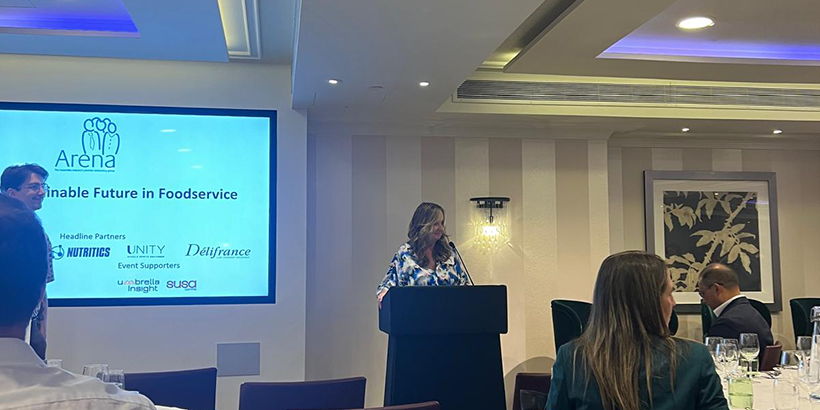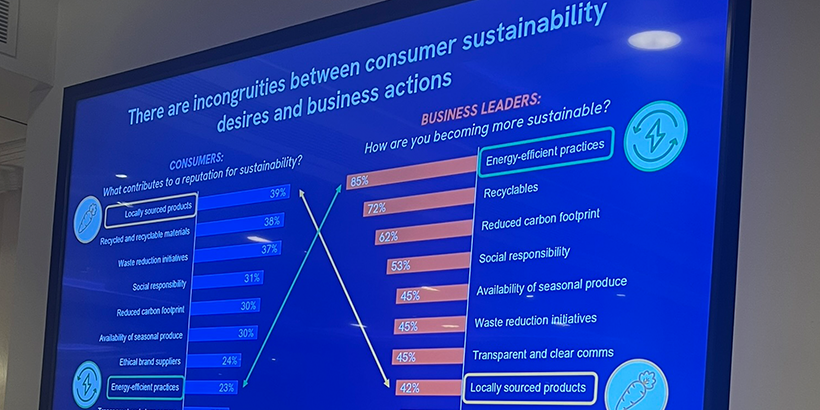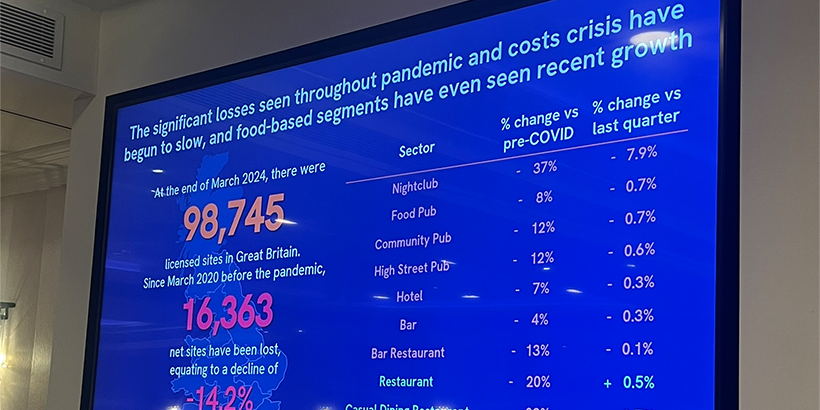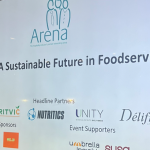Arena: Creating a Sustainable Future in Foodservice & Hospitality
Hosted for the first time at St James’ Sofitel, Arena’s most recent event centred around arguably the most pressing issue facing the industry and the world at large: how can we all work to create a more sustainable future? With a key insight address from CGA and a dedicated panel discussion from some of the industry’s most senior leaders, it was an event not to be missed and so of course, as the leading foodservice agency, we were there in force.
Kicking things off, Reuben Pullan, Senior Insight Consultant at CGA by NIQ, took to the floor for ‘Building Back for a Sustainable Future’ – a state of the nation overview and a deep dive into how sustainability is impacting the foodservice and hospitality worlds.

Little surprise that there was no sugarcoating the impact that COVID-19, Brexit and the cost-of-living crisis has had on the sector as a whole, but a positive angle started things off with insight showing how losses had begun to slow and some food-focused sectors had even seen some initial growth in the last quarter.

It was a common theme throughout – challenges are undoubtedly still peppering the industry, but there is light at the end of the tunnel. Wage costs, for example, are still having a huge impact, but on the upside, staff shortages are decreasing, having almost halved since August 2023. Food Price Inflation may still be up year-on-year, but it had also experienced two consecutive months of record decline.
Perhaps most promisingly, there’s a clear desire to still spend, especially among those more resilient multi-site operators, with over half saying they plan to increase investment over the next year. Despite the evident challenges, there is real appetite to invest and do so in a more sustainable way, to help future-proof multiple aspects of operators’ businesses.
With an overview of the market captured, it was time to look at things through a sustainability lens. From the off, it was clear that sustainability ranked highly among operator worries, with 68% saying it was a tangible concern as they looked to the future. And whilst progress has undoubtedly already been made – with more seasonal, ethically-sourced, and vegan options on menus, a third of operators admitted to feeling behind the curve when it comes to sustainability.
On the consumer side, it was revealing to hear that 68% of us are trying to lead an environmentally friendly lifestyle. That said, looking at drivers of venue choice, convenience, choice of food and value for money were all ahead of sustainability begging the question; how do those two nuggets of insight align? In short, sustainability is not a driver but an expectation in out-of-home visits and making it integral to your whole offering is key for a committed customer base.
Finally, it was time to look at how consumer and operator priorities around sustainability harmonise (or not). Sure enough, consumer desires – which tended to prioritise locally sourced products and waste reduction initiatives – were not as high on the agenda for businesses for whom energy efficient practices were top of the list (perhaps due to the resulting cost-savings). A key insight for businesses to remember as they implement and shout about their sustainability plans.
Ultimately, insight showed that the future political climate may mandate a more sustainable approach – the time to act is now.

Following aa chance to network along with a fantastic three-course lunch, and a thorough grounding in the state of the nation, it was the panel’s turn to discuss their own personal and corporate journeys with sustainability.
Jon Levy, MD, Levy UK & Ireland, opened the session with some hard-hitting facts around climate change, his personal desire to take action and the resulting partnership with Notpla that he has spearheaded in his efforts to put sustainability at the top of Levy’s agenda. Then followed a panel discussion, hosted by Mark Chapman, Zero Carbon Forum along with some of the industry’s most respected and influential leaders: Jon Dale, Strategic Corporate Affairs and ESG Lead, Punch Pubs & Co; Jon Davies, MD, Levy UK & Ireland; Mike Hanson, Director of Sustainable Business, WSH, Mark Jankovich, CEO, Delphis Eco and Julie Owst, Head of Sustainability, Bidfood.
Re-education quickly became a key recurring theme: re-educating lower-skilled chefs on produce; re-educating the public around expectations of food in hospitality; re-educating operators on the full supply chain and what sustainable options look like within that. A real desire to share knowledge came to the fore with all panellists agreeing that gatekeeping would help nobody, and that collective action is one of the most powerful tools we have on the road to a more sustainable future.
The importance of taking everyone with you in a shift in your business’ sustainability mindset was also discussed at length. Explaining the ‘why?’ to your customers, to your clients, the supply chain, your internal staff members was crucial for all members of the panel, re-emphasising the power of education and the need for collective action.
However, the seismic change that these industry heavyweights have all begun to see is the change in investor appetite – a step viewed as supremely positive to start to enact change. With consumers now demanding sustainability wherever they go, CEOs have had to sit up and take note. Record numbers attended COP21 making the ‘buy in’ for sustainable initiatives a real priority at executive level. With more capital made available, all panellists felt positive about the future and the changes that could be made. What’s more, with the general election fast approaching and sustainability a crucial talking point as we look to future governments, sustainability has never been higher on the agenda.
For a look at how jellybean is approaching sustainability, visit: https://www.jellybeancreative.co.uk/environmental-social-governance-policy/
To attend future arena events, visit: https://arena.org.uk/events




